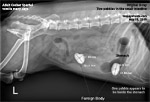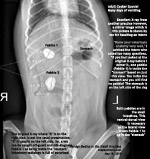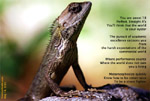Story 1: Mind Your "Rs"
and "Ls"
May 18, 2010 is the last day of internship for Teresa.
Three months of 6 days of seeing practice had passed by so
fast. This is the forgetful intern who had caused me great
embarrassment in the case of saying that the weight of a 3.6
kg cat as 2.6 kg. On this last day, I told her that I expect
her to do well in her first-year veterinary studies and not
have to re-sit examinations.
Our last case study was the discussion on the X-rays of a
Cocker Spaniel who had swallowed stones and was operated by
another vet. I had asked the owner to bring in the CD of the
excellent X-rays taken by another practice.
"It would be a simple
veterinary radiology case," I thought. "Just show where
the two pebbles are located. Either in the stomach or
intestines."
Teresa downloaded the images into the desktop. I was surprised
that the positioning of the "R" and "L" were not in their
usual position as shown in veterinary radiology books and in
almost 100% of small animal practices. Vets are used to seeing
the "R" on the left side of the X-ray and "L" on the right
side. In the original X-ray, the "R" was on the right side.
So, a vet who does not check these two letters, would
naturally and incorrectly diagnose that one pebble is inside
the stomach and the other is in the small intestine.
I said to Teresa: "Veterinary life is always full of
surprises. Veterinary medicine and surgery can be extremely
stressful and challenging. A human doctor needs to know one
species. A human surgeon specialises in one system, e.g. the
alimentary system. A vet needs to know various diseases
of many animals and is expected to operate on all body systems
from the nose to the tail. It can be overwhelming for a new
graduate."
I explained to
Teresa that a vet also needs to have an excellent knowledge of
veterinary anatomy in studying X-rays. "If you look at the
original X-ray, the one with the lateral view (picture, left),
you will think that one pebble is inside the stomach," I said.
"It is actually outside. You will
need a ventro-dorsal view
to confirm it.
 |
 |
|
Lateral view. The
mirror image of the original X-ray. Most vets are used
to seeing this positioning |
Original X-ray |
"From the ventro-dorsal
view (picture, below), you can see that the pebble is outside
the stomach in the small intestine. This is because I have
made a mirror the image (picture below) of the original X-ray.
If you don't mirror image, you will think that one pebble is
in the stomach and one is in the small intestine. This is
because almost 100% of the vets view the X-ray with the "R" on
the left side of the X-ray. The stomach is located on
the left side where the "L" will be shown in the usual X-ray.
In this X-ray, the "R" is on the left side and if the vet does
not have an excellent knowledge of veterinary anatomy, he or
she mis-diagnose the pebble as being inside the stomach. If he
operates, he will find no pebble."
I gave her a tip. "Just use your fingers to palpate the whole
stomach before you incise it and you will feel that there is
no stone. Take out the small intestine and palpate the length.
Don't just incise the stomach based on the X-rays. This is the
second check."
Teresa had no idea what I was talking about as she had not
studied veterinary anatomy but she is an intelligent girl and
will know what I was talking about.
"What is that black circle inside the stomach?" Teresa asked.
"It is stomach gas." I said. "It is not a foreign body."
 |
 |
Ventro-dorsal view.
The mirror image of the original X-ray. Most vets are
used to seeing this positioning |
Original X-ray.
I would use this for the final year examination of the
5th year vet student if I was teaching vet radiology! It
will test their grasp of the canine veterinary anatomy. |
|
Mind your
"Rs" and "Ls" |
"You have to know
veterinary anatomy very well," I said to the intern who
tested my patience with too many questions. "Otherwise, you
will look at the X-ray and think that the pebble is inside the
stomach. Assuming you have only one X-ray, the lateral view.
You still don't have to worry. You use your hand to feel the
stomach. Such a large pebble can be felt. Do not incise the
stomach first."
I don't know whether Teresa would remember this last case. But
with 3 months of solid attendance at 6 days a week including
Saturdays and Sundays, she must have had picked up a lot of
knowledge. I wished her well. She was one of my best interns
and one who caused me grief and great embarrassment in the
case of
FORL in the Burmese cat. That is why some Singapore
veterinary practices don't accept interns.
Story 2: Character
referee sabotages the intern's prospects
On this same day, the aunty of a prospective intern who had
taken a lot of trouble to e-mail me phoned me. I was already
fed up with this aunty who did not keep her appointment to
meet me last Friday. During the conversation, I asked whether
she could get a character reference who is not the mother for
me to interview. The aunty said: "It does not matter. My niece
can come to Jakarta when she comes back from the U.S."
I just could not believe my ears. This aunty was supposed to
be the niece's character reference. She did not turn up after
making an appointment last Friday. And now, she actually
sabotaged her niece's prospects for internship. This was
really weird. "Your niece has excellent grades and is the one
who approaches me for an internship," I told the aunty in a
loud voice. "She is an intelligent girl and has got her
American professor to write her an excellent testimonial. Now
you talk as if I am the one desperate for her services!"
I did not want to continue the tele-conversation with this
aunty as I was really fed and I had plenty of things to do.
The relative was actually sabotaging the niece's future.
First, she did not turn up for her appointment to support her
niece. Now she made casual remarks about internship. A
take-my-niece as an intern or leave it, old boy!
The aunty must have
thought that veterinary internships are a dime a dozen! Her
niece has excellent grades and everybody will accept her as an
intern. There is something not right with this thinking.
 From
this episode, all prospective veterinary interns should be
careful as to whom they ask for help in getting character
references. Never ask somebody who is not really keen to help.
You really can get sabotaged. And it is an unpleasant
experience for me to talk to such referees. From
this episode, all prospective veterinary interns should be
careful as to whom they ask for help in getting character
references. Never ask somebody who is not really keen to help.
You really can get sabotaged. And it is an unpleasant
experience for me to talk to such referees. |
 TOA
PAYOH VETS
TOA
PAYOH VETS TOA
PAYOH VETS
TOA
PAYOH VETS